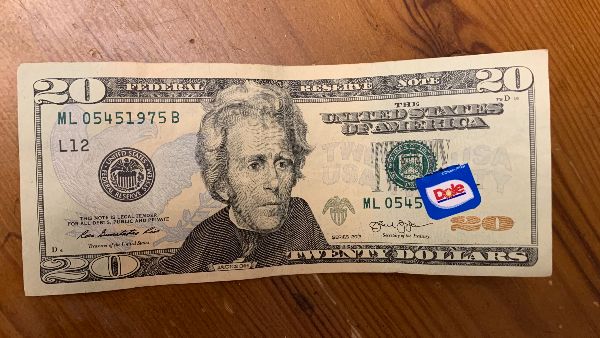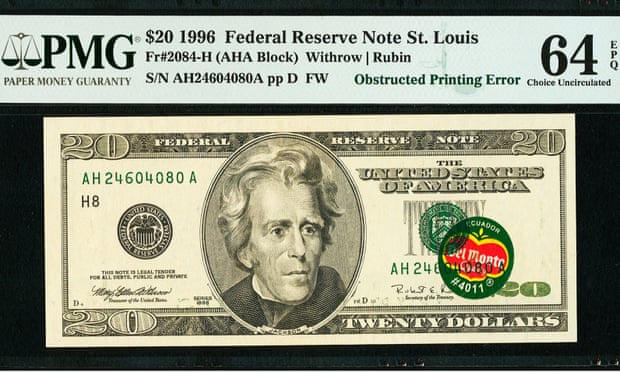Andrew Jackson Has Gone Bananas

Somewhere in your house right now, chances are you have a banana. And if you’re in the United States, you probably also have a $20 bill. Here’s a fun little experiment you can do.
First, lay the $20 bill face up on a table. Next, peel the brand sticker off the banana. Now, take the sticker and rotate it clockwise about 15 degrees. Then, place the sticker on the bill so that it just overlaps with the edge of the third digit (excluding the two letters) on the serial number printed in the bottom-right of the bill.
Congratulations! You now have a $20 bill with a banana sticker on it. (There’s mine, above.) The bill is worth $20, probably (It may be worth less because you’ve now covered up the serial number. You may, therefore, want to remove the sticker now.)
Okay, so maybe that little experiment isn’t all that fun. It seems like a waste of time, in fact; adding a banana sticker to a $20 bill isn’t going to make the bill special. But that’s because you’re doing this experiment at home, probably in your kitchen, etc. And more importantly, you don’t live in a print shop run by the United States Department of the Treasury. And more to the point, no matter how hard you try, your Andrew Jackson with a Banana Sticker is never going to look like this:

See the difference? On your bill, the banana sticker covers part of the serial number. On the bill above, though, the serial number has magically appeared above the sticker. If you didn’t notice, that’s OK — but luckily, at some point in the last 25 years or so, it caught the eye of a college student who received the bill above from an ATM. He might as well have won the lottery. Simply stated, the sticker is only there because of a nearly-impossible failure of quality assurance protocols combined with incredible timing. Heritage Auctions explains:
United States Currency is essentially printed in three stages: the first printing is the back of the note, the second printing provides the face devices, and the third, final printing includes the Treasury Seal and the serial numbers. When this note was printed at the Fort Worth facility of the Bureau of Engraving and Printing, it went through first and second printings before the sticker found its way onto the surface. [It’s unclear whether the sticker was placed there intentionally or if someone’s snack break went awry.] The sticker’s placement is ideal, as it covers part of the second printing details and is overlaid by part of the Treasury Seal and serial number from the third printing.
All told, this makes this bill incredibly rare – it is, literally, one of a kind. And it is therefore worth a lot more than its $20 face value. A lot more. The value is, pardon the obvious pun, bananas. In 2003, the Del Monte note, as it is now commonly referred to, sold for just over $10,000 on eBay. At 500 times the bill’s intrinsic fiat value, that seems absurd. And it is — it’s absurdly low. About three years later, the guy who bought the bill on eBay, a collector named Daniel Wishnatsky, auctioned it off anew — and scored a $25,300 top bid. Not accounting for various fees, that’s about a 35% annualized return on investment.
And Wishnatsky almost definitely sold too soon. Earlier this year, the bill found itself on the auction block yet again. According to the Guardian, the owner at the time listed the Del Monte for $57,000, more than double what it went for fifteen years prior. And the bill sold — but not for $57k. On January 22, 2021, the bill sold “for $396,000 to an unidentified bidder who, according to Heritage Auctions, ended up in a bit of a heated bidding war with another phone bidder and two other live internet bidders.” That’s a world record for a single bill of its type, beating a 1934 U.S. $10,000 banknote that sold for $384,000 in September 2020.
At three for a dollar, the Del Monte note is therefore worth more than a million bananas.
Bonus fact: In 1982, making jokes about bananas was illegal in Zimbabwe — kind of. Two years earlier, the nation elected a man named Canaan Banana as its first-ever President, but many refused to take him seriously; as the Telegraph reported, “Banana had some difficulty investing the office of president with the required aura of reverence.” Fearing that his last name wasn’t all that appealing — I mean, fearing that his last name was making it too easy to poke fun at him, the government passed a law in 1982 preventing such monkey business; joking about his last name was forbidden under the new law. It’s unclear if the law is still on the books or if it has slipped away into history.
From the Archives: Gone Bananas: The bananas you eat aren’t the same type as the ones your grandparents ate. But they are radioactive!
